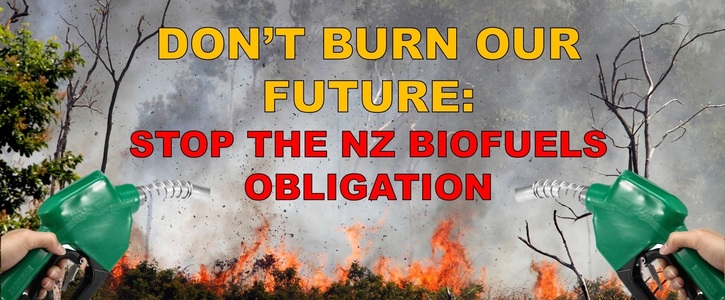Petition is successful with 3,121 signatures
To: Hon Megan Woods, Minister of Energy
Don’t burn our future: Stop the NZ biofuels obligation
8 February 2023: Today the Prime Minister Chris Hipkins announced that the NZ Government has dropped its Biofuels Obligation Bill!

We are calling on you to drop plans for the proposed biofuels obligation. The obligation will have the unintended, but unavoidable outcome of forcing suppliers to blend conventional, food and feed based biofuels into liquid fuel supplied within Aotearoa New Zealand from 1 April 2024.
Why is this important?
Because growing extra food crops to use for fuel, which is what this policy would cause, drives the destruction of the natural world, will worsen the impacts of climate change and increase the costs of both food and fuel.
We are calling on the Government to drop plans for the proposed biofuels obligation because of the overwhelming evidence that:
🌏 Similar biofuel directives around the world have caused massive net increases in greenhouse gas emissions compared to using regular fuel. EU Biofuels policy has acknowledged this, but so far the EU policy response of Sustainable Source Certification has not been successful.
🌏 Growing the feedstocks for biofuel drives tropical deforestation, destroys biodiversity, increases emissions and deprives indigenous people of their land and livelihoods.
🌏 Biofuel obligations drive up food prices, as the majority of biofuels are made from food and feed crops. Food price increases worsen living conditions for the most vulnerable people around the world.
🌏 Non-food ‘second generation’ biofuels, or those derived from food waste are not available in the necessary volumes, or at all. Introducing a biofuels obligation will not change this, as fuel suppliers will naturally try to meet the obligation at the lowest possible cost.*
As well as all this, introducing an unsustainable biofuel directive will waste time and resources that could be directed to meaningful climate action.
Join our call on the government to drop its plans for the biofuels obligation. We also call on the government to focus on addressing transport and energy emissions using methods that are proven to work, such as renewable energy, electrification, increased public and active transport, rail freight, coastal shipping and demand reduction policies.
We also support policies that are likely to be effective in developing a sustainable wood waste-to-liquid fuel industry in New Zealand, as part of a comprehensive and co-ordinated national energy strategy.
Low Carbon Kāpiti is a grassroots community organisation and climate advocacy group that hosts the Don’t Burn Our Future campaign.
More on this topic from Don’t Burn Our Future:
https://www.greaterauckland.org.nz/2022/07/11/biofuels-in-new-zealand-a-solution-or-a-problem/
https://lowcarbonkapiti.org.nz/wishing-for-fairy-dust-why-the-nz-biofuels-obligation-is-the-worst-kind-of-magical-thinking/
*Government estimates that second generation biofuels from wood waste will cost 2 - 4 times more than conventional, food-based biofuels, and will not be available in the short or medium term. Local supplies of food waste such as used cooking oil and tallow from meat processing are too small and difficult to secure given the demand for them from overseas.
We are calling on the Government to drop plans for the proposed biofuels obligation because of the overwhelming evidence that:
🌏 Similar biofuel directives around the world have caused massive net increases in greenhouse gas emissions compared to using regular fuel. EU Biofuels policy has acknowledged this, but so far the EU policy response of Sustainable Source Certification has not been successful.
🌏 Growing the feedstocks for biofuel drives tropical deforestation, destroys biodiversity, increases emissions and deprives indigenous people of their land and livelihoods.
🌏 Biofuel obligations drive up food prices, as the majority of biofuels are made from food and feed crops. Food price increases worsen living conditions for the most vulnerable people around the world.
🌏 Non-food ‘second generation’ biofuels, or those derived from food waste are not available in the necessary volumes, or at all. Introducing a biofuels obligation will not change this, as fuel suppliers will naturally try to meet the obligation at the lowest possible cost.*
As well as all this, introducing an unsustainable biofuel directive will waste time and resources that could be directed to meaningful climate action.
Join our call on the government to drop its plans for the biofuels obligation. We also call on the government to focus on addressing transport and energy emissions using methods that are proven to work, such as renewable energy, electrification, increased public and active transport, rail freight, coastal shipping and demand reduction policies.
We also support policies that are likely to be effective in developing a sustainable wood waste-to-liquid fuel industry in New Zealand, as part of a comprehensive and co-ordinated national energy strategy.
Low Carbon Kāpiti is a grassroots community organisation and climate advocacy group that hosts the Don’t Burn Our Future campaign.
More on this topic from Don’t Burn Our Future:
https://www.greaterauckland.org.nz/2022/07/11/biofuels-in-new-zealand-a-solution-or-a-problem/
https://lowcarbonkapiti.org.nz/wishing-for-fairy-dust-why-the-nz-biofuels-obligation-is-the-worst-kind-of-magical-thinking/
*Government estimates that second generation biofuels from wood waste will cost 2 - 4 times more than conventional, food-based biofuels, and will not be available in the short or medium term. Local supplies of food waste such as used cooking oil and tallow from meat processing are too small and difficult to secure given the demand for them from overseas.


